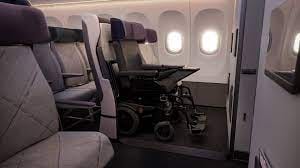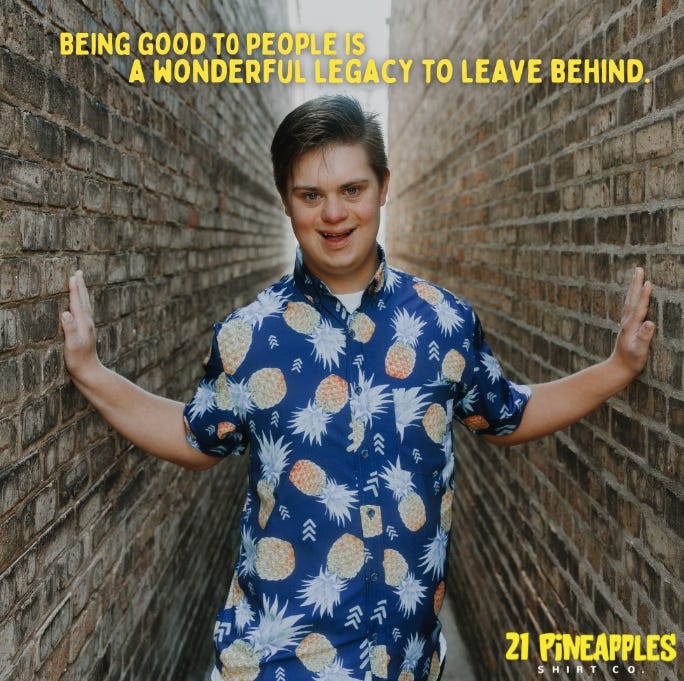Making Strides
Volume 98
I’ve been reading an excellent book lately called The Empowerment Paradox, by author Ben Woodward. It’s chock-full of interesting facts, perspective and advice about how to transform struggle into strength, including this: “The simple thought of doing good is enough to change our brain chemistry…Research has found many examples of how doing good in ways big or small not only feels good, but also does us good. For instance, the well-being-boosting and depression-lowering benefits of volunteering have been repeatedly documented, as has the sense of meaning and purpose that often accommodates altruistic behavior.”
Today’s newsletter spotlights companies and organizations that are working hard to do good things that specifically benefit persons with disabilities, which I personally find quite inspiring. I hope to bring more news like this to you in the weeks and months ahead. (Just thinking about that makes me feel good, actually.)
A special note to fathers this week: best wishes for a fabulous June 18! May you feel celebrated, appreciated and loved for all the good you do.
As always, thanks for being here.
There is nothing impossible to they who will try.
— Alexander the Great
Friendlier skies.
Fasten your safety belts! Delta Flight Products recently debuted an airplane seat that will allow travelers who use a wheelchair to bring it onto the plane and remain seated in it for the duration of the flight. Created in partnership with UK-based Air4All, the prototype was unveiled last week at Germany’s Aircraft Interiors Expo. According to Air4All, “Commercial aviation is the only mode of transport that has no regulations to allow power wheelchair users to travel safely and with dignity seated in their own chair in an aircraft cabin.” As many of us know all too well, the complexities of traveling with a powerchair are endless, and unfortunately result in people often not traveling. Let’s hope this advancement is the change we need. Now.
Awesome assistive tech.
Apple recently introduced improvements to its iPhone and iPad intended to make them easier to use by people with cognitive and developmental disabilities. Calls, Messages, Photos, Music and Camera features have all been enhanced. Live Speak, Personal Voice, and Point-and-Speak have also been developed to assist people with vision and speech challenges. One reviewer’s praise (below) for voice-activated tech really hit home with me, as Siri and Alexa are lifelines for our adult son with cerebral palsy. Like Colin, I applaud Apple and encourage all families to experiment with what’s available for potentially life-changing benefits.
Not to be outdone, Google has updated Maps programming to automatically display a wheelchair icon for locations that are wheelchair-accessible. Designed to let people “know before they go,” this feature will be helpful to folks using a wheelchair, stroller or even just a rolling suitcase. (It’s called universal design for a reason, right?) Although the site doesn’t provide extensive information (like whether restrooms are accessible, for example), this update is still a huge step in the right direction.
Festive Father’s Day.
Looking for a last-minute gift for Dad? Check out online apparel company 21 Pineapples Shirt Co. I love their mission of changing the way folks perceive people with special abilities “one funky shirt at a time.” Plus, a percentage of all sales goes to support Down Syndrome organizations throughout the world. Good on them.
A little bit more.
Here’s follow up information on stories covered previously in this newsletter:
Inclusive Religion — In an email to me last week, one generous reader recommended this Califormia-based resource to help religious organizations be more welcoming to people with disabilities.
Making a Difference — This article shows just how impactful one person can be when they advocate for change. Evacuation chairs definitely should be mandated in schools higher than one story. As John F. Kennedy once said, “One person can definitely make a difference, and everyone should try.” What difference can you make today?
Job Opportunities — In a recent op-ed article, a senior fellow from The Harkin Institute offers the perfect value proposition for expanding employment opportunities for people with disabilities:
Disability inclusion is not an act of charity or philanthropy. Nor is it compliance with laws and government mandates. Rather, disability inclusion is a management strategy that encourages companies to attract a diverse pool of talent while maximizing the skills of their employees in a way that creates long-term value for the company, investors, customers, and society.
He also reminds us that innovation by and for people with disabilities has mass application and universal benefit (go Apple and Google):
Cruise control in vehicles, the phonograph, the ever-popular text function or touch features on mobile phones, the electric toothbrush, and the internet. All were innovated by people with disabilities as part of designing themselves into a culture and society that did not center on their needs. Yet each innovation quickly found its way to mainstream acceptance, enjoying widespread commercial success, and fostering a positive change in how billions of people work and live — regardless of disability status.
Another Normal is a newsletter dedicated to helping families with disabilities bloom and thrive. If this e-mail was forwarded to you, please subscribe and join our community. You can also hit the “heart” button at the bottom of this e-mail 🖤 to help others find us on the internet.
To all our new subscribers — welcome.
To all our readers — thanks for being here.





I always look forward to reading Another Normal to learn something new and start my day and week feeling that there is much good out there...
When I saw this on the news my first thought was… yeah for Andrew!